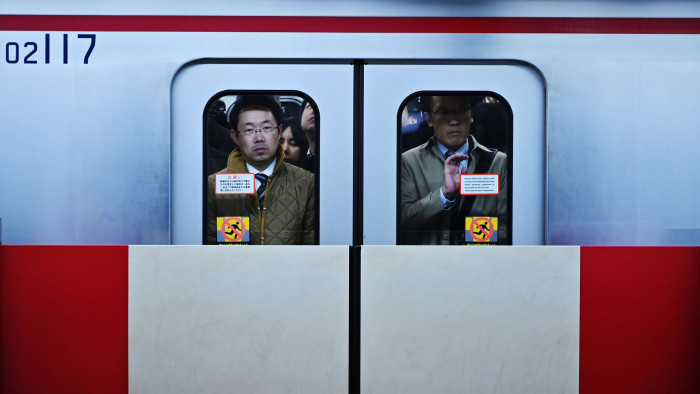Frequent flyer: commuter politeness and why I’m still standing
Roula Khalaf, Editor of the FT, selects her favourite stories in this weekly newsletter.

Every week or two, as I stand in a London Underground carriage, a young commuter catches my eye and offers me a seat. I always decline, although I have learnt to do it with a mouthing of “thanks”.
Inside, I’m annoyed at the thought that I look like I need a seat. I don’t. I’m in good health and do not feel a day over 32. But I find London’s youngsters distressingly polite — more so every year.
Perhaps you feel differently if you actually need a seat. Possibly you find Tube travellers horribly indifferent. But from what I see on my twice-daily journey, most elderly passengers get offered a seat. I even occasionally see what Oliver Scott Curry, a University of Oxford researcher, called, in an interview with the BBC, “competitive helping” — several people leaping up at the same time.
I have travelled on subways from New York to Tokyo, Brussels to Hong Kong, but those journeys there have been too short and episodic to draw any conclusions about whether the passengers are more or less polite than London’s.
I did notice, on my last trip to Paris, that stepping out of a crowded Metro train to let passengers off did not give me the right to be the first back on, as it would in London, but perhaps that was just a bad day.
I asked my colleague Victor Mallet, who worked with me in London, is now based in Paris and was previously in Hong Kong, whether he had noticed any differences. He said there was nothing he could put his finger on, although recently someone had, for the first time offered him a seat. “I assumed he was a lunatic,” he said.
I have been searching for a study into comparative commuter politeness in different cities, but no one seems to have bothered to get statistically significant numbers of elderly people to stand on crowded subway trains around the world, recording how often they were offered a seat.
Instead, a trawl of newspapers around the globe reveals what many of you probably feel: an intense irritation at the rudeness of fellow commuters on subway systems and commuter trains. “The lack of etiquette shocked me,” a San Francisco Chronicle reporter said this month of his journeys on the city’s Bart network. Priority seats were occupied by those who didn’t need them. “So far I have not witnessed any of these squatters offer their seat to an old person.”
Introducing Culture Call, a new FT culture podcast

Join us for a transatlantic conversation as co-hosts Gris (in London) and Lilah (in New York) interview the people who are shifting culture today — across books, art, music, online and on screen. They will also bring you behind the scenes of FT Life & Arts journalism
“Blocking the doors and playing music on speaker are two of the most common complaints,” Indrani Banerjee of Kolkata’s Metro Railway told The Times of India. And Swiss English-language news journal The Local reported that “People put their feet on the seats, open their Tupperware containers with homemade pasta salad . . . and put on their make-up.”
Of course, there is bad behaviour — leaving discarded food cartons, and, worse, banana skins on the London Tube, for example — but as public transport brings millions of strangers in closer proximity to each other than they ever are to anyone other than their most intimate companions, a certain distaste is inevitable.
London Underground offers “Baby on board” badges (I still occasionally see pregnant women standing) and “Please offer me a seat” badges for those with hidden disabilities. A 2017 survey found that 78 per cent of “Please offer me a seat” badge wearers found it easier to get a seat. Other cities, including New York, have adopted the idea.
Those of us still standing can play our part in keeping seats free for those who need them. I’d be happy to wear a badge that says “I don’t need a seat. Really.”
Follow Michael on Twitter @Skapinker or email him at michael.skapinker@ft.com
Follow @FTLifeArts on Twitter to find out about our latest stories first. Subscribe to FT Life on YouTube for the latest FT Weekend videos
Listen and subscribe to Culture Call, a transatlantic conversation from the FT, at ft.com/culture-call or on Apple Podcasts
Letters in response to this article:
Offer of a seat is a sharp reminder of how old I am / From Max Beran, Didcot, Oxon, UK
Parents — NYC Transit is not the Disney monorail / From Alice Bray, New York, NY, US
Cheeky way to get a seat / From James Hedges, Shaftesbury, Dorset, UK
Comments